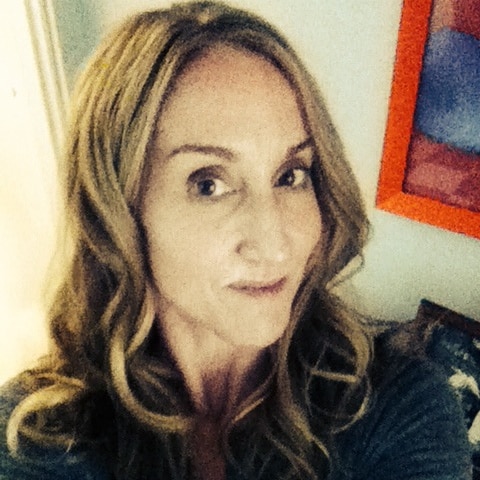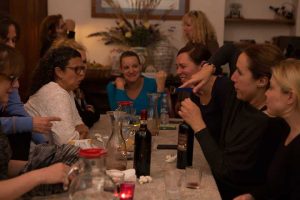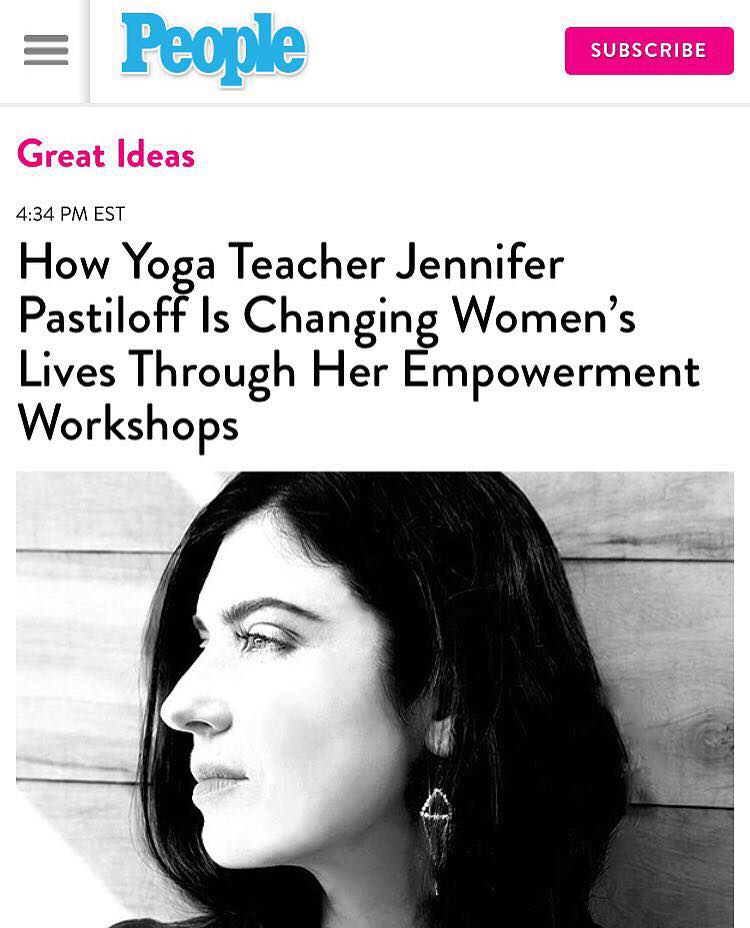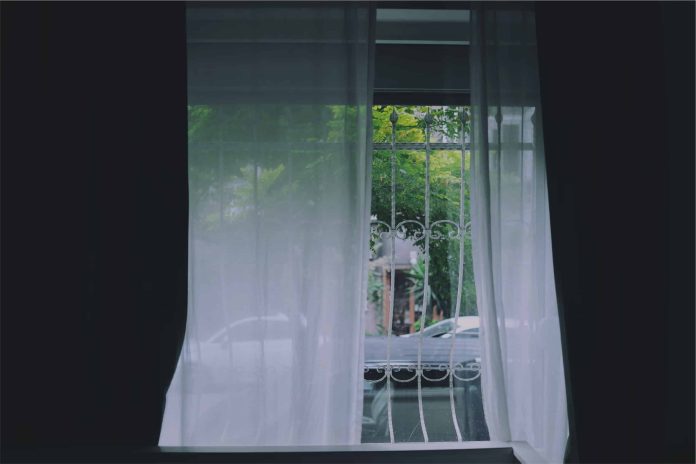By Kim Derby
The silence hits me in the face when I walk in. Free of beeping and flashing bright lights, her hospital room is nothing like what you see on TV, the monotonous drone of machines sprouting tubes, blaring alarms. Instead it’s stillness, and the creak of the door as it closes behind me. Daylight streams through a window across the room, lights up her face. I move toward the bed, cautious as if she had a virus I might catch.
“Hi Mom. It’s your daughter. I’m here.”
Her mouth is open, slightly ajar. A lip-gloss sits on the table next to her. Someone must have applied it recently because her lips glisten. I touch her cheek with the back of my hand. Ice. And I pull the blanket up around her neck. Hold her hand, I tell myself, but she’s tucked tight under the bedding. Swaddled. I hate myself for being too freaked out to reach under and take her hand. I reach for her cheek again, rub it softly with the back of my hand. Her 76-year-old face is bare, free of mascara or makeup. It glows, smooth like un-worry, free of wrinkles, contempt or scorn.
“Mom, your skin looks really good.” I think she’d like to know.
Saliva collects under my tongue and I’m glad I haven’t eaten in three hours. I step back from the bed, swallow. I think I’m going to be sick.
Three years ago, ALS began taking her body hostage. All of her muscles, legs arms hands throat, have been slowly, efficiently, shutting down. Now her throat is finished and closing, she hasn’t eaten or had fluids for two days. She refused a feeding tube. Her final request a DNR.
Do Not Resuscitate.
*
“Ungrateful little bitch! No wonder you have no friends!”
Words that knocked the wind out from under me left me gasping for air. I was eleven and wanted to scream back at her, I do too have friends! But she’d said it enough times I wasn’t sure, which of us was right.
She had me by both wrists, pinned in a corner of the dining room. I struggled to break free.
“Stop resisting me!”
Veins bulged on her neck as she yelled, her face a dark shadow. The front porch light filtered through the creamy silk drapes, reflected off the crystal chandelier, giving the room a luminous glow. She dug her nails deep into my forearms.
“Ow! Leave me alone! Let go of me!”
She released one of my wrists and smacked the side of my face.
I glared into the dark, speechless. After an hour of this on a school night, all I wanted was to flee and go to bed.
“I wouldn’t need to hit you if you’d stop…fighting…me!”
Her words struck with each forward reach for my free arm.
“What did I even do?”
“You’re a selfish little bitch! I do everything around here and I’m exhausted! I need your help, without having to ask! And without you rolling your eyes at me!”
Saliva flung from her lips and splattered my face.
“Gross, Mom!”
I twisted my arm until hers could go no further, and she let go. I wiped spit from under my eye with the back of my hand. A wave of smoke flushed my brain and I felt dizzy, hot. I wanted to hit something. Instead I screamed,
“I hate you! When I have kids someday, I’m never letting you see your grandchildren!”
Her arms slackened. Eyes dull and black, she morphed from monster to desperate and I scooted around her and leapt up the stairs to my room.
Upstairs I crawled between the cool sheets of my canopy bed. My dog Addie jumped up and settled into a ball at my feet. Then footsteps. I held my breath, squeezed my eyes shut until black purple spots formed under my eyelids. The door opened.
“You’re in bed already?” Her voice sucked the air out of the room. “Kimi?”
I refused to answer, my lungs solid, clenched.
“Aren’t you going to kiss me goodnight?”
Silence. And finally, she closed the door and was gone. I gasped for air, desperate after holding my breath for so long.
*
Her eyes are open, barely, a morphine-drip droopy. Clear liquid whispers, like floating clouds with a silver lining, shoot into her veins. I envy them, her veins, and watch the clear bag, drip drip drip. The only thing connected to her body. The only sound is her breath. An urgent inhale, like when you’re startled or spooked. Or maybe more like after swimming underwater the full length of the pool, when you break the surface, lungs greedy for air. She gasps loudly, followed by an extended syllable of tribal, guttural moaning. A groan erupts from her depths, a decrescendo. I look around; wonder if I should do something, like call the nurse. Then silence. Thirty seconds of silence. I watch and wait. It’s unsettling, the moment stretched like awkward. Last stage breathing. End of life breath. That’s what it’s called, the nurse tells me later. Gulps of air, extended exhales and silence, explained in the small, sky blue pamphlet she offers me along with I’m so sorry written in her eyes. I flip through the pages quickly and set it aside, most of the death stages already done.
A lump curdles in my throat. “I love you Mom. And I know you love me too.” Words to reassure myself. I know you love me too.
Suddenly, another gasp falls forward toward a descending groan. I hope the breath leaving releases her, of what I don’t know. I rest my hand on hers, the thick layers of bedding between us, and with the other hand I touch her cheek.
*
I was nine years old the first time my mother threatened to take my little brother and leave. She was just back from a week spent nursing my grandmother back to health after emergency gallbladder surgery. The innocuous organ was strangled by scar tissue grown from a previous surgery; it exploded while my grandparents vacationed in Las Vegas. My father stayed home with my brother and me.
“I can’t stand it here anymore! I’m taking Kevin and we’re leaving!”
“Wait, what?” I screamed, mouth ajar, eyes like a deer in danger.
I felt her eyes on me but I watched her hands, beautiful long fingers, trembling.
“Your father likes it better when I’m not here! He hates me.”
She grabbed my wrist, pulled me toward her, so close I could smell her warm mint breath. Salem Menthols. A tear rolled off her chin and her sad eyes seemed far away, unreachable.
Shaken, I wanted to say something, stop her from repeating words I hated but knew were true. Except my mouth didn’t cooperate. Body rigid, my fists clenched, and I repeated a mantra to myself: I don’t care. I don’t need you. I don’t need anyone.
“He said you and he get along just fine when I’m not here!”
The entire week she’s gone, my father and I exchanged maybe three words. I didn’t ask anything of him, or talk to him, or need him. She thought my drunken father liked me better but he didn’t like anyone. He liked being left alone.
“Little bitch,” slithered past her tongue as she turned away, “You’re perfect for each other.”
I winced, a rock in my stomach, sharp edges rubbing skin. I wondered what she meant other than a daughter, her first-born, equals a vacant vessel of a husband. Feet frozen, I stared at her back and the rest of the room around us–a 100-gallon freshwater fish tank, brown leather sofa, orange shag carpeting, TV and Atari game station.
When my mother was away I knew to keep quiet, stay out of my father’s way, mostly because she didn’t. She nagged and begged and he yelled, wouldn’t even look her in the eyes. I was nine but already I knew marital disdain, a stench that wafted through our home, a prison of bad smells.
She turned around and stared through me, “I’ll go and take Kevin with me! You can stay here with your father!”
I bit my lip to stop the pressure building behind my eyes. The worst part…I didn’t want to be left behind or go with her.
*
My niece Rose and I are in my mother’s apartment to pack up her clothes for donation to Goodwill. My mother has been dead two days. We start with a closet, one hanger at a time. I remove each garment; drop the plastic hanger in a pile on the floor. I carefully fold, treat each piece of silk, cashmere, wool as if it’s worthy of care. I’m meticulous the way I place each item inside the extra-large Hefty trash bag, one by one. I do this for a while, listening to Rose chatter, a nine-year-old easily distracted. Then I move more quickly, get careless. I think I should feel guilty, as if she might enter the room any moment, grab a blouse from my hands and huff, “I have to do everything myself or it isn’t done right!”
I look over my shoulder at the door, just in case, then watch Rose as she rummages through my mother’s, her grandmother’s, makeup drawer. She smiles when she looks up at me, holding out her hand,
“Aunt Kim here, try this one. I think it will look good on you.”
When I was growing up, my mother and I never shared clothes, makeup, or secrets. Still, whenever I was alone in our big house on the hill, I would sit in her walk-in closet beneath flowing fabrics, between rows of shoes, size 8-1/2s, lined up on each side. I tried on a pair of heels or sandals, always way too big for my little feet. Mostly I just sat there in the quiet darkness and waited. For what, I’m not sure. Sometimes I explored her makeup drawer, fascinated by the Lucite plastic compartments, clean, exact. Not a used Kleenex on the counter or item out of place. Perfect, pristine. Our entire house, like a stage set no one lived in. Now I walk across the room, kiss the top of if my niece’s head and take the frosty mauve shade she offers me. I lean in to the mirror, and apply it to my top and bottom lip.
Daughter mouth covered with dead mother lipstick.
“You look pretty!” Rose says.
My chest aches from loving this nine-year-old with such ferocity. I hug her body into mine; inhale her girl scent. “You’re pretty too. And I love you.”
Rose smiles, grabs a handful of hangers and skips over to the bed. Her job is to organize them. I look in the mirror again. My face is tired and drawn, my mouth too dark. My mother’s lipstick shade is not one I’d choose, but it’s hers and she’s dead. So I apply more, rub my lips together; slip the lipstick tube into my pocket. My fingers carefully inspect the plastic tube in my pocket, round and smooth, the size of a mother’s mouth, a mother’s love.
*
The second to last time I saw my mother alive, was a year before she died.
“She’s declining quickly, the disease is wreaking havoc,” my brother tells me over the phone. “She has trouble talking, swallowing, eating. It isn’t pretty.”
Despite my misgivings I think it’s the right thing to do. So I drive the seven hours to my brother’s place where I will stay the night. From there we drive ten minutes to her home, where a nurse watches over her 24 hours a day. But she won’t live here much longer. In nine months, her house will go on the market and sell in less than three weeks. My brother will move her into a facility nearby.
But tonight we have a light supper, stay for an hour or two. We sit around the glass-top dining table, like we have so many times before, my brother, sister-in-law, niece, nephew, my mother and me. Only this time my brother and I plan the meal, forage through her pantry and refrigerator, trying to muster up something from not much at all. The woman our mother once was, generous hostess with a house full of fresh foods and drink, is gone. In her place, a woman who can’t talk, can barely eat. She takes a minuscule bite of stale cracker with cheese, chokes, drools, dabs a tissue to the corners of her mouth.
I stare. I can’t help it.
I don’t want to talk because the deep moan of syllables that will be her answer is untranslatable. She tries to speak anyway and I look at my brother like, ‘Help?’ or ‘How the fuck am I supposed to understand her?’ He has learned a new language, accustomed to deciphering her groans. I feel like I’m traveling in a foreign country, on alien land. When I look down at my plate I notice my hands in my lap, clenched, grasping at nothingness. Holding on so tight my knuckles are white.
My nephew makes a silly face. Everyone laughs, briefly, but my mother keeps at it, falls into a childlike giggling spell. Not laughing. Giggling uncontrollably. It’s an odd sound coming from a 75-year-old woman. Again, I stare. I’m in shock, unable to eat.
My hands are still grabbing for something to stop me from falling.
I stand up, begin cleaning the kitchen and putting stuff away. Keep busy, don’t stop moving. I can’t just sit and stare. I can’t. It hurts inside my bones, the walls of my esophagus ache.
The kitchen is clean and I approach my mother in the foyer to say goodbye. I lean down and hug her. Mostly paralyzed and confined to a motorized wheelchair, she’s a mound of soft, flax flesh. My arms, a part of me but not me, hold on longer than usual. I feel a lump in my throat and pull away. Her eyes are wet too, and for a moment we simply look at each other. My heart wants to open, it’s begging to be free, but I won’t let it. No. I need air.
A brisk kiss on her cheek and I clear my throat. “I love you, Mom.”
“Uh uh uh uhhhuhhh.” Forced grunts, a sound for each syllable. I love you toooooo.
I turn and walk outside without looking back. I’m a body of air, vapor, weightless and clear. Nothingness and fog between my ears, I move without intention. I can’t feel my hands. I am blind to anything but the stones making a footpath below me. Halfway to the car I stop; notice a sharp clench in my neck. Then muscle spasms climb from my toes skyward. Who is that woman and where is my mother? Stomach bile rises and tears flow down my face. I swipe them away with the back of my hands, returning to myself. A burst of air releases from my tight chest. I gasp for a breath but can’t catch one. My hands go to my knees, head down. I’m light-headed, my gut a black hole of dense pain.
Still crouched over, I look up toward the street. My sister-in-law and the kids wait in the car at the curb. I’m sure they’re watching me, an aunt/sister/daughter/woman who hasn’t seen her mother in months, now quivering, unable to move. My brother Kevin is still inside saying goodbye, but he’ll see her tomorrow, or next week. He lives ten minutes away. I’ll return to Los Angeles and not see her for almost a year, until she’s in the hospital swimming in morphine. Until the day she will die.
*
By the time I was twelve or thirteen, if my mother reached out to hug me, I cringed and held my breath until it stopped. If I accidentally touched her, my skin flinched, an involuntarily body function, a bone-shaking revulsion. My heart sealed shut, like molten rock, layers of earth hardened over time. I felt next to nothing. If you’d asked me what love felt like, I’d have told you barbed wire and long sentences held hostage in my throat. Or I might have just walked away, left you standing open-mouthed, wondering. Definitions are like the wind, changeable, salty with sea anemones, a convergence of whispers. Words don’t mean anything unless you morph them, so I called love something else–eating, drinking, smoking, screaming, sucking, spitting, chewing, swallowing, and giving blowjobs.
The hospital room is frigid. It’s 100 degrees outside and I didn’t bring a sweater. I rub my hands together, stick against stick, hoping for fire. Nearness in a room of death and I won’t hold her hand, but at least I’m here. I showed up. I reach for her cheek. Skin to skin. A chill and I shiver.
Her mouth is still stuck at open, agape for gulping and shoving out air.
“Mom, I forgive you. I hope you can forgive me.”
Six years earlier I was in rehab in Santa Fe because I couldn’t stop having sex in parking garages with my married boyfriend. His car parked at work. No one in my family knew I was ‘away’ for five weeks, or that I needed to be. My third day there was my mother’s birthday. I didn’t send a card or call, which was a first, so I know she noticed. That ‘first’ catapulted into a sort of sabbatical, five-plus year self-imposed exile from mother. Ungrateful little bitch!
And now she’s dying.
I walk to the window, watch people move through the automatic doors at the hospital entrance. People living lives like me, circling death, waiting for the inevitable–last wishes, a rewritten will, everything left to my brother, nothing to me the supposedly ungrateful daughter. Without turning around I say, “I hope you can forgive me. I had to take care of myself. I’m sorry.” I move across the room to the bed, return to her side and lean in close, “Mom, It’s okay. You can let go. It’ll be okay.”
I speak as if she hears me, as if I know what I’m talking about.
*
I open the top drawer of her dresser–bras, panties, socks–scoop up everything with two hands and turn toward Rose,
“Hey sweet girl, can you hold open that bag for me?”
Eagerly she bounces toward me, hands outstretched and giggling. I lean in and release the cluster of beige undergarments clenched at my chest. We’ve been at it for hours, six trash bags so far, stuffed and piled under the window across the room. My brother will stop by later and take them to Goodwill. I turn back to the dresser, the next drawer.
I look at Rose and smile into her clear, lake blue eyes.
“Thanks for helping me do this, sweet girl.”
Rose is tired, her enthusiasm waning. Still her muffled voice is my lifeline, a kite string I hang onto or I might float away, evaporate. My body is mostly vapor, a hazy offshore fog. I’m light-headed and hungry.
“Let’s finish this and get out of here. Okay, Rose-bud?”
It’s been two days and I can still hear my mother’s last thirty seconds of silence, the un-breath between her gasps and moans. I look around her apartment and wish she would send me a message, tell me what to keep, how to remember. Wanting something, something more than the tube of Revlon lipstick in my pocket. The taste in my mouth feels unnamable, untouchable in its newness. I can’t pronounce it. Like gasps and groans, or perfect soft skin, the chill of a dimly lit hospital room and the memory of a mother’s screaming mouth covered in frosty mauve. The lipstick I wear and carry in my pocket when Rose and I leave my mother’s apartment, empty of her things, as if she were never there.

Kim Derby is a fourth generation Californian and LA native. She lives in Pacific Palisades with her pitbull and two cats. Kim spent two decades working as an executive assistant to C-Suite executives, until she finally quit to start writing. Her first paid gig was four years as a senior writer for EcoSalon (ecosalon.com/author/kim-derby/), one of the first ‘green’ lifestyle blogs. Then she took a memoir class at a local community college (SMC) and hasn’t looked back. Frosty Mauve is an excerpt from her work in progress, a memoir, and her first creative nonfiction publication. You can find Kim on Twitter @kimderby77 and Instagram @kimderby




You write as beautiful as you are and as elegant as your yoga practice.
Just WOW! Thank you for this stunningly poignant baring of heart and soul.
Your writing took my breath away! I could actually “feel” every word! A truly amazing piece!